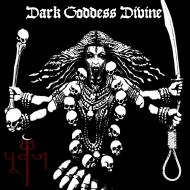 I’d experienced Vedic metal before and gained insight into this extremely dark form by listening to Rudra and interviewing the band’s highly intelligent leader Kathir. Where I was breaking new ground here was in reviewing metal from India. This seven track EP is the work of Purvaja, a one person outfit from Hyderabad.
I’d experienced Vedic metal before and gained insight into this extremely dark form by listening to Rudra and interviewing the band’s highly intelligent leader Kathir. Where I was breaking new ground here was in reviewing metal from India. This seven track EP is the work of Purvaja, a one person outfit from Hyderabad.
An introductory chant is followed by a blackened death metal track called “She, who devoured Raktabija”. There are no prisoners taken here. As it lays waste to everything around it, the next ball of deadening thunder, “Kali Tandav”, seems more of a preached rant. Clashing drums, razor-sharp guitar work and overall persistence make sure the spars fly. The soundscape so far is a sort of black-death metal that could come from anywhere. It’s not obligatory to mix ethic Indian or other sounds with black metal, indeed the latter seems to be very much part of this punishing Vedic metal form. I once went on record as comparing Rudra to Enslaved, and here on Purvaja’s work there’s an old school delivery which recalls those Nordic people. As I was thinking that some ethnic content would enhance it, along comes a Hindu chant in the title track “Dark Goddess Divine”. I really think this both heightens and darkens an already intense atmosphere. The track slows down as the Indian drum beats discreetly and menacingly. The clouds are thickening. A pedestrian momentum is raised. Purvaja will not be rushed. Evidently it’s a tortuous road. The guitar strain in the background suggests malevolence and nothing else. Again the appropriately titled “Worship Death” conveys a raw image of forced labour and hardship. Purvaja presses his point home. No danger of colour is there to break through the black clouds and fire. The end is marked with the sounds of swarming insects and terror.
I admit that I’m too orientated to western history and culture to get all the references here, but I can tell you that this work pays homage to Kali, the Hindu goddess of destruction and death, who is associated with eternal dark energy. “She, who devoured Raktabija” would seem to be a reference to Kali licking up the demon Raktabija’s blood, which if dropped on the ground would lead to a duplicate of Raktabija being born. The violence of the theme is there in the music, and there is faint evidence of an Indian guitar style, but I don’t think it would have been artificial to supplement the dirty sounds of “Dark Goddess Divine” with yet more home-grown and ethnic influences. Saying that, this is still an impressive representation of black and vedic metal art and mythology.
(7/10 Andrew Doherty)

Leave a Reply